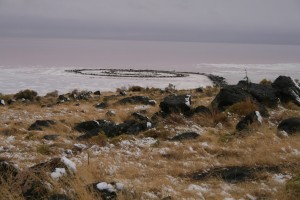 One of the most important premises of environmental thought seems to be that we do damage to the earth because of indifference, ignorance, and apathy, and that the solution, therefore, is to rekindle affections for places, for natural beauty, and for the simple pleasures of the outdoors. In the hands of more romantic thinkers, this formula becomes a kind of quasi-spiritual journey and an argument for a renewed form of animism. If we just paid nature closer attention, it would reveal its spirit to us and its inherent goodness, and we would discover, almost inevitably, our reasons for caring.
One of the most important premises of environmental thought seems to be that we do damage to the earth because of indifference, ignorance, and apathy, and that the solution, therefore, is to rekindle affections for places, for natural beauty, and for the simple pleasures of the outdoors. In the hands of more romantic thinkers, this formula becomes a kind of quasi-spiritual journey and an argument for a renewed form of animism. If we just paid nature closer attention, it would reveal its spirit to us and its inherent goodness, and we would discover, almost inevitably, our reasons for caring.
I have long been persuaded by much of this diagnosis, and I still believe that for many people, a simple rekindling of appreciation for nature is an important place to start. But I am not convinced that the only reason we do damage to the earth is because we don’t care. I think we do damage to the earth sometimes because we feel we want and need to. I think sometimes we are so afraid of nature, afraid of its powerful reminders of our mortality, afraid of its indifference and power, and afraid of not being in control, that we act out in violence against it, almost in a subconscious way.
A more superficial form of environmentalism would say that this fear is merely due to a lack of appreciation for its caring and womb-like qualities, as if Mother Earth always has her arms outstretched, ready to gather her children in a warm embrace. Or it might say that this is due to a failure to see nature’s beauty. But any serious understanding of the complexities of ecosystems, and the myriad and almost untraceable interdependencies between life forms, and the dizzying array of life that has existed on this planet, not to mention the staggering amount of death and violence that lie at the heart of life’s engine, leads to the conclusion that there are many good and important reasons to fear nature. It is simply a fear that we need to do a better job of recognizing and owning up to. Even nature’s beauty is so surprising and unpredictable that if we are serious about attaching ourselves to it, it leads us out and away from home, it drains us of any confident sense of a discrete self, and it can challenge our most fundamental trust in an ordered world.
Trust is a form of faith. Faith is not determined by the nature of things. By definition, it stands out and maybe even sometimes goes against the grain of the way things are. This is partly why it is often in a tenuous, if not antagonistic relationship to reason and empirical reality. I believe in providential order and I trust in purpose, but the more closely and honestly I examine the world, the more I understand that this trust is something I own independent of the world’s workings. Understanding this, I have come to experience an almost ecstatic feeling regarding things I cannot understand, things that diminish me, and things that challenge my feeble and narrow methods for ordering the world to my liking. It seems odd to realize now that my faith is stimulated by what one could easily argue are causes for doubt. This brings a peace with nature, a peace with things as they are, and a willingness to continue to learn more from the great mystery of life rather than feeling threatened by it.
I wrote a piece recently of literary criticism that explores some of these themes in a more academic way. It is short, and it features Melville, so those are at least two reasons you should read it. You can find it here at a new website, edited by the brilliant Bill Jordan, that promises lots of insights into the question of values as they pertain to environmental care.











